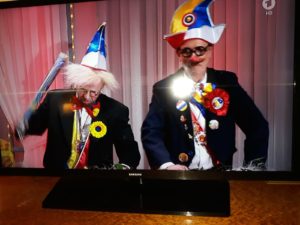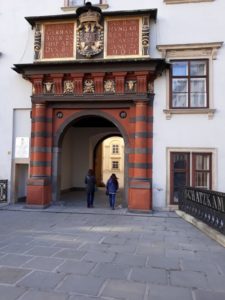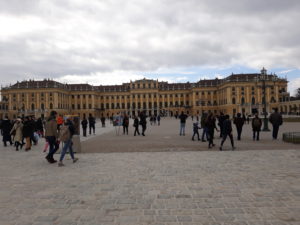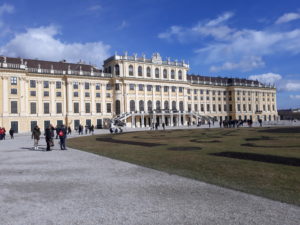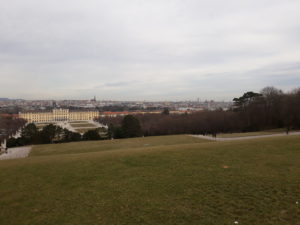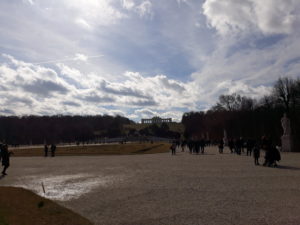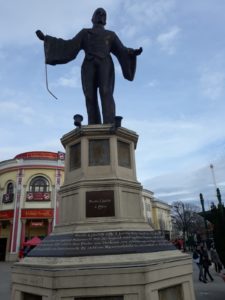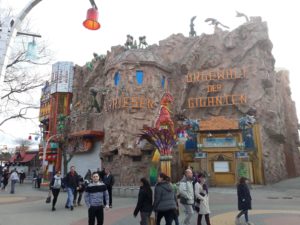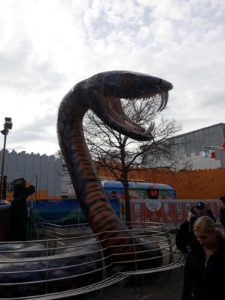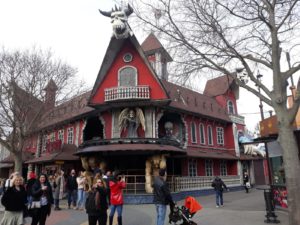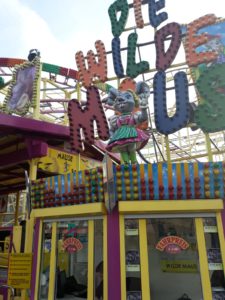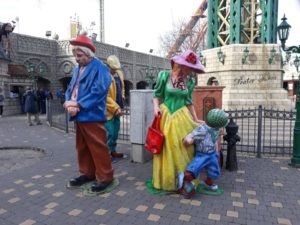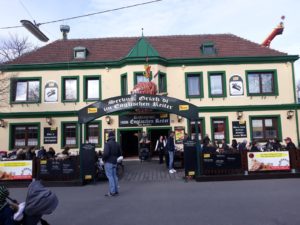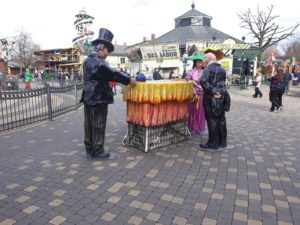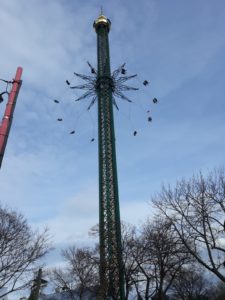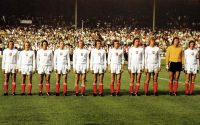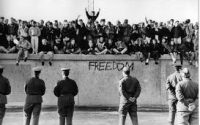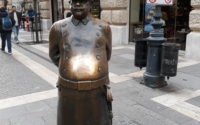At Europe’s Core: Part 1 – Vienna
Why name it thus? The Austro-Hungarian Empire may have disappeared 100 years ago, in the political sense but the nations that evolved from it’s break up are not nations in the sense it would be understood in Britain. Even before being absorbed in to the Empire, countries such as Poland, Bohemia, Slovakia, Croatia, Slovenia, western Ukraine and Austria and Hungary themselves contained diverse peoples within their boundaries. These were political entities and in this true sense there is no such nation as Britain regardless of what ideological politicians might claim. And so to the core of Europe, where my roots lie. This is not my first visit to Austria, but my first to Vienna.
28.02.2019
Vienna – I already have an idea what I’ll find there, having seen countless travel, historical and current affairs documentaries about Central Europe; but the main reason this time is my connection with the city – my paternal grandparents Edward and Joanna were born here in 1891 and 1899 respectively. I treated these as mere passing facts without further thought. Edward served in the Austro-Hungarian army in WW1 as an officer. I never did ask the obvious question – how long did they live there?; just assuming instead that they returned to Galicia (a province of the Austro-Hungarian Empire then, now partly in Poland and Ukraine). And then various other questions begin to emerge. Joanna’s family lived in Lemberg, later Lwów, now Lviv and I suspect that Edward’s family may have come from Kraków. I have a hypothesis – Kraków and Lwów were important predominantly Polish cities in the province of Galicia in the Austro-Hungarian Empire. Both had been at the forefront in the Polish-Lithuanian Commonwealth, Lwów in particular, a city of mixed nationalities but all possessing citizenship regardless. Both families, I am certain, were middle to upper middle class- szlachta – which roughly translates as gentry. Was it business or perhaps government that brought both families to Vienna? There must have been frequent visits to Vienna, considering there was almost 9 years of an age difference between my grandparents. Did both families already know each other? Did both live in Vienna until adults or did they spend their early years there? My grandfather went to study at the University of Lwów so I wonder, if the families already knew each other, did the Moszoros look after Edward while he attended University? Was it then he married Joanna? In the loosest terms this class of family intermarried with another of the same class. This was the way it was in Europe before WW1.
My sister Maureen found a website of the Austrian national Archives, which is online and accessible. It is arranged by parish and as Austria was a devoutly Roman Catholic country, Vienna has several hundred so if I find birth notices for either soon, it will be down to shear luck!
It is an easy train journey from Vienna International airport to the city centre and then, having learned my lesson when I was ripped off by a taxi driver in Kraków, I asked taxi drivers the cost to the hotel, having already researched beforehand what I should expect to pay. The first wanted €30 so it must have been the tourist route. The actual cost was €12 and the driver a Serb who warned me not to trust middle easterners as they are not popular in Central Europe. That was his opinion.
Hotel Bellevue is an old-fashioned building which evokes the spirit of the turn of the century and the type of environment my grandparents would have recognised.
01.03.2019
Where to begin in this wonderful city with its manifestations of past imperial glory? My head is everywhere out of the tramcar window. A free walking tour appeals to me mainly because the guides have the incentive to deliver their best as tipping is voluntary. Until then? The Sacher café is nearby and here is an opportunity to sample the world famous torte especially as the queue is not too long. In the end I only have a 10 minute wait to be seated and that’s something else crossed off the bucket list. I have to say that torte is better than my attempt a few years ago – probably because I did not include a glass of Prosecco with mine. Far East Asian tourists would appear to include this café on their bucket lists too.
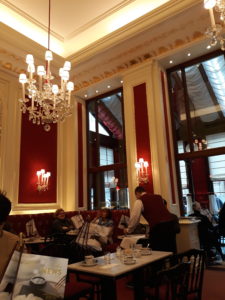
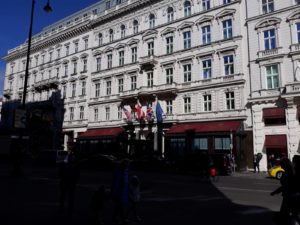
The walking tour is hugely informative and the guide passed round recommendations for cafés and bars and advised where to find the best Wiener Schnitzel , with veal not pork, at a reasonable price and also places to visit. One place she recommended is ‘Trześniewski’ (pronounced tsheshnee- evskee) a buffet bar founded, by a Polish gourmand, Franciszek Trześniewski, from Kraków in the early 20th century. The speciality is rye bread finger size bites with an extensive variety of toppings, all washed down with 0.18l size tankard of beer. Very original and very appetising too.
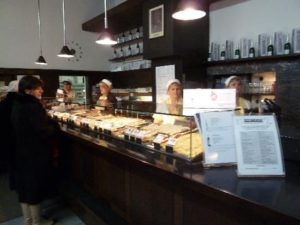
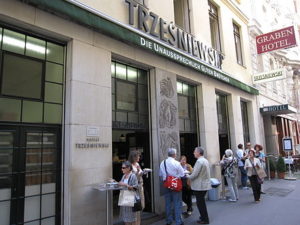
The histories of the countries of Central Europe are massively intertwined with marriages across royal dynasties causing borders to be fluid and the notion of nationality is not applicable. Our Austrian guide confirmed this and it something I have guessed for some time. This idea of citizenship is more appropriate and my father told me this long ago, but it was a concept, having been raised in Scotland that I did not quite understand. I honestly believed that my background was something of a rarity, blissfully unaware this was the norm in Central Europe. Therefore the notion of Aryan blood as espoused by the Nazis in Germany was unadulterated rubbish. Poland, Germany, Hungary, Austria, Czechia, Slovakia and Romania are not really nations despite efforts, previous and past to create one. Nationalism of that sort, no matter where, is destructive.
Here in Vienna, the Polish King Jan III Sobieski is revered as the saviour of Vienna from the Turks in 1683. For now I am happy for those seven countries to be integrated by culture and cuisine, language is less important. I’ll make a start tomorrow on the individual places of interest starting with colossal St. Stephen’s Cathedral. In Austria they seem to love political satire as much as the people in Britain. This show is on TV and it features Boris Johnson and Nigel Farage. See if you can tell from the photo who is who.
02.03.2019
In a big city, in another country for the first time, the best thing a newcomer can do is, I think, to plan ahead and not be caught out and in a panic. Google to find out the route to where you are staying whether by taxi or public transport and if by the former, get an idea of the cost. Get a travel card in advance and collect. For Berlin, I always have the pass sent to the house, for here in Vienna, I collected it at the arrivals lounge at the airport. For smaller cities it doesn’t matter so much. All this saves much hassle and staggering round in circles asking if anyone speaks English.
I learned yesterday that Lenin and Trotsky planned the Russian Revolution from the Central Café, however today it is raining and a longish queue has formed outside the café, so I think this will have to be for another day – Monday when everyone has returned to work.
From a reading of history, you get a sense of complacency that thrived on the surface in the late 19th and early 20th century, while underneath discontent, nationalism, militarism thrived all over the continent. What could possibly go wrong in this Austro-Hungarian Empire? The royal families of Russia, Germany and Great Britain were interrelated through marriage – surely that’s a guarantee of peace and France – the centre of new thinking in an atmosphere of freedom absent in these other countries with the exception of Great Britain. But even here the humiliation of the Franco-Prussian War bubbled angrily in the national psyche. Meanwhile, here in Vienna, people took peace for granted and the ruling classes waltzed to Mozart and Strauss and attended the opera. Franz Josef, the Emperor had ruled for as long as anyone could remember and the notion of war or revolution were absent from the mindset…..if you discounted the activities afoot in the Central Café. But the nationalist Poles, Czechs, Slovaks, Croats have had enough, Serbia is at odds with Austro-Hungarian Empire and perpetually with Turkey. Germany and Great Britain vie for industrial superiority. So this, historically, is how things always go wrong and it takes over fifty years to fix it and in less than one hundred years the cycle of violence begins again. This is not pessimistic fatalism, maybe not even human nature but a powerful small clique’s thirst for dominance over their neighbour. Economic competitiveness and nationalism are volatile elements when they merge. Are we at this point now? Level-headedness is being shouted down as appeasement in large sections of the media and politicians at the highest level blur the distinction between truth and falsehood. What a collection of thoughts as I stroll among these wonderful buildings! Take a look for yourself
St. Stephen’s Cathedral is a welcome respite from the rain that’s been falling all day. These old cathedrals are a tangible example of how style changes over the centuries. The earliest part of the cathedral construction began in the mid 12th century and is late Romanesque. It then changed into Gothic and the interior is Baroque which is Counter-Reformation style evident in the countries that constituted the Austro-Hungarian Empire and also in Southern Germany.

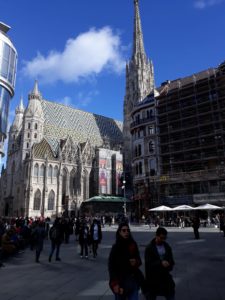

The buildings in the city centre smack of imperial power and monuments on a massive scale dedicated to Empress Marie Therèse (she of the world famous Pragmatic Sanction so beloved of school history lessons) and Emperor Franz Josef confirm that imperial past. Were my great-grandparents part of this civil service? It seems a reasonable hypothesis, however I’d need to return here after some more archive research at home and then a historian who might be able to put flesh on the bones. Here are wonderful examples of what Vienna has on show:
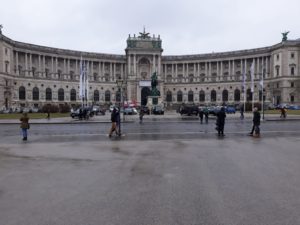
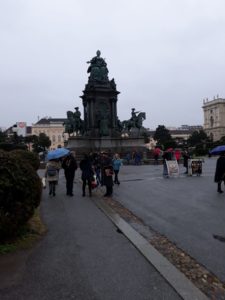
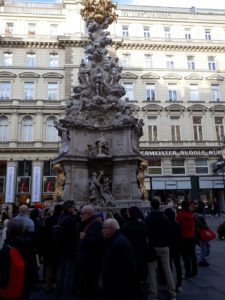
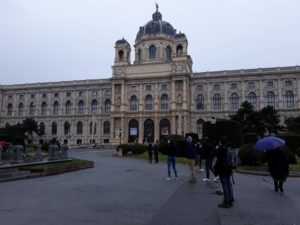
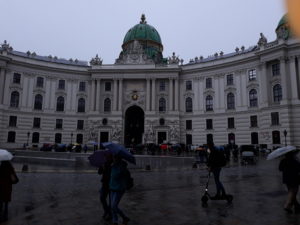
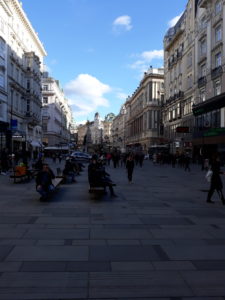

Meanwhile, heeding the phrase ‘carpe diem’ (living for the moment) I’ll head to another of the tour guide’s recommendations ‘Café Diglas’.
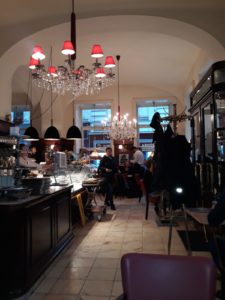
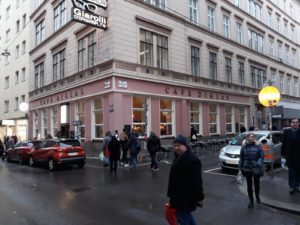
The rain and chill are soon forgotten in this traditional café, so traditional, that only cash is accepted.
03.03.2019
Yesterday was rain all day and a raw chill which made the day a bit tiresome; mitigated by the meal at Café Diglas. As it is completely dry today, I’ll spend more time outside today and catch up on things I might have seen yesterday and the first stop will be Schönbrunn Palace, the residence of the Austrian Emperors since the reign of Empress Marie Therèse (she of the Pragmatic Sanction). What must the Palace be like in the high season? I have 45 minutes to wait to get in for the audio Grand Tour (free as I have a Vienna Pass). If possible avoid any capital city in the high season. It’s an impressive palace packed with history but at the end I realise I never want to see another royal palace. As with royal palaces world-wide it looks as if half the stuff has been nicked from its original owners. This opulent life style, cloistered, fawned upon by courtiers craving back-stabbing attention, under threat of being deposed or assassinated and a palace stinking of intrigue with ordinary citizens smothered by absolute monarchy.
Ever since I saw the film ‘The Third Man’ starring Orson Wells, post-war Europe has fascinated me partly because though my father, I was directly involved. The background of bombed-out Vienna of 1946 against the Wiener Riesenrad or Prater Ferris Wheel, as it is advertised, is emblematic of the city for me, having defied the bombs. What a contrast this is from the opulence of Schönbrunn Palace. Here at Prater Park is a showground full of garish fairground rides, music and with my sense of the absurd and burlesque (in the real sense of the word) I cannot help but laugh at the comical designs of the entrances to the fairground rides interspersed with ordinary folk just enjoying a pleasant Sunday afternoon out. I would recommend any visitors to the city to come here and absorb the atmosphere way from grand buildings and palaces. Even if you detest fairgrounds you will come away feeling lighter. Look and see what I mean.
I’m now getting a feel for Vienna and I have spent the day speaking German only even when the Viennese speak English. As I’ve repeated before; a couple of days surrounded by the language, and the vocabulary floods back. The Viennese dialect is softer than standard German but my ear is attuned now. Anyone who wants to improve language skills really should spend a week in the country. You don’t have to live lavishly, in fact you’ll always have a chance to say a few words casually to the locals. Remember, you’re going to absorb the culture and the language and you don’t do that in fancy restaurants and hotels.
04.03.2019
I finally make to the Central Café. I might emulate Lenin and Trotsky and plot the British Consensus Revolution from here as the current British government seems hell-bent in deferring to the rantings of an unrepresentative right wing clique! Coming to such a famous place I do not mind that the coffee costs nearly £4.00 and a slice of delicious cheesecake a further £6.00 as this may be a once in a lifetime visit. Imagine, my grandparents living here as one of the most momentous events in 20th century history is being created over a Viennese Melange coffee! How ironic that our two famous revolutionaries should frequent an establishment which is the antithesis of proletarian.
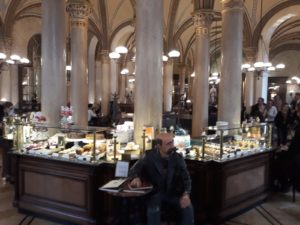
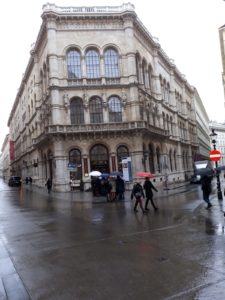
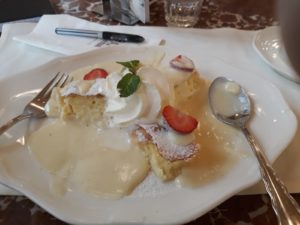
The complacency that drove Lenin and Trotsky on foments unrest and it’s always the rich with their self-centred attitude, dismissive of the plight of the poor and unrepresented that causes the eruption. Anyone is entitled to become rich but that brings social responsibility which many, but not all ignore. I feel that the world is at that juncture again and we are set for turbulent times as the nefarious far right and far left indulge in ideological warfare as society burns around them. Are we capable of bucking the historical trend and avoiding the chaos and mayhem that satiates ideology?
Central European cuisine is hearty and very appetising but after five days I’ve tired of it and cannot face another helping of it today. Off the beaten track there is a street food place specialising in pitta bread fillings of a Middle Eastern and African tradition and so it’s Shawarma today which has filled me well enough for this evenings Mozart-Strauss concert in the Kursalon.
There are thousands of visitors to Vienna from the Far East of Asia and while they congregate in throngs, they really make the most of their visit by sightseeing and trying all the cafés even though once they are all seated there is no room for anyone else. And here’s something else – they all speak English.
Far Eastern visitors are also there in numbers at the Mozart-Strauss concert which they all seem to enjoy. They put us to shame with their absorption in the culture. I didn’t care that the ticket cost the equivalent of £30.00 and that I’m not really a classical music buff – this is Vienna after all. A great concert with two encores one of which was my father’s favourite that everyone can join in – Strauss’ Radetsky March. The enthusiasm with which people join in the chorus with hand-clapping is heart-warming and a great way to round off this visit.
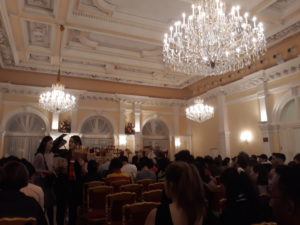
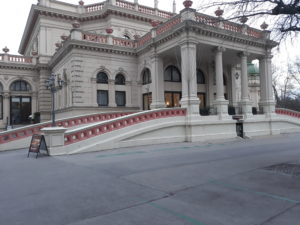
I intend to build on this first visit with a return armed with the results of research into my grandparents’ time in the city of their birth. Tomorrow it’s on to Budapest another new destination.
Ends
